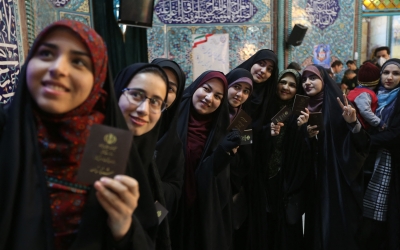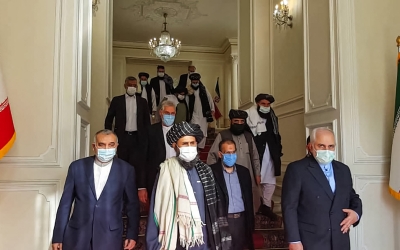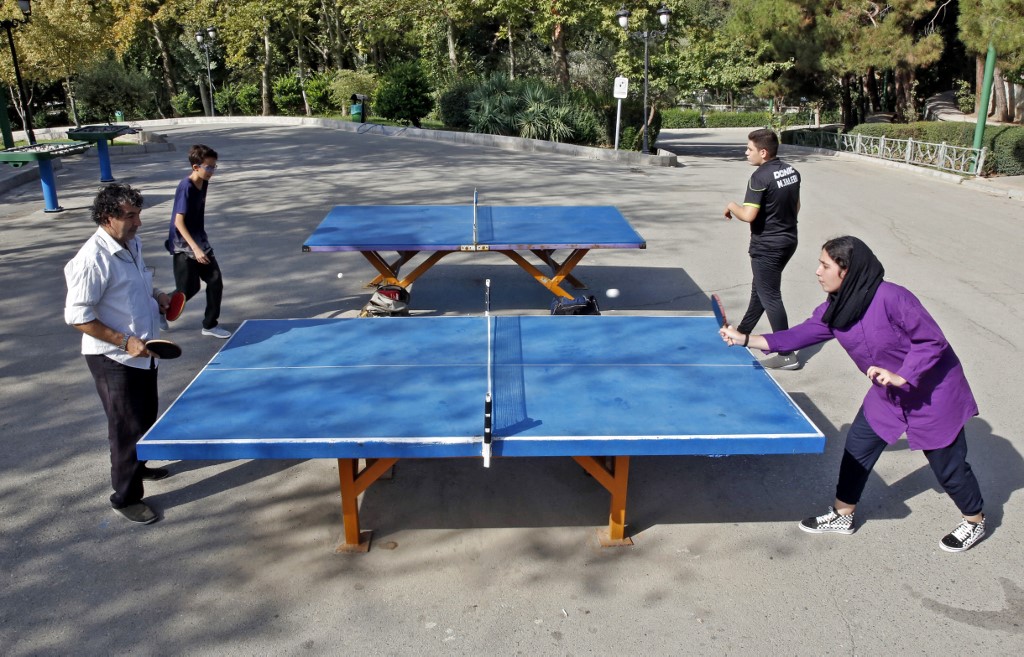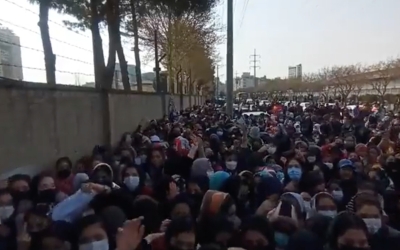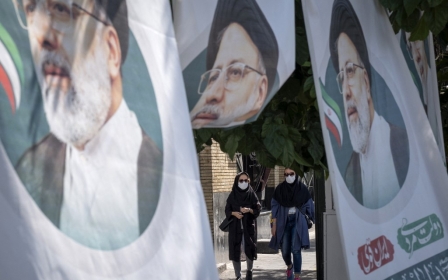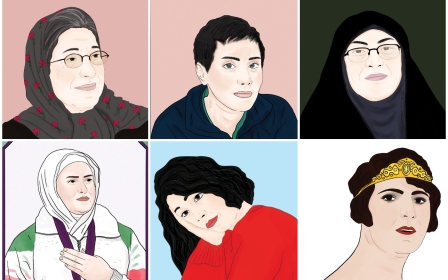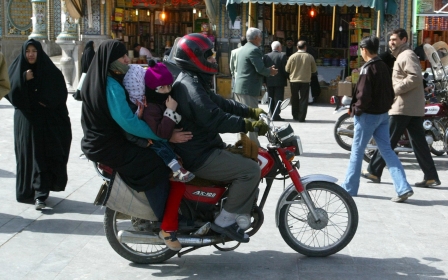Iranians in Tehran fear mayor's gender-segregated parks the start of harsh restrictions
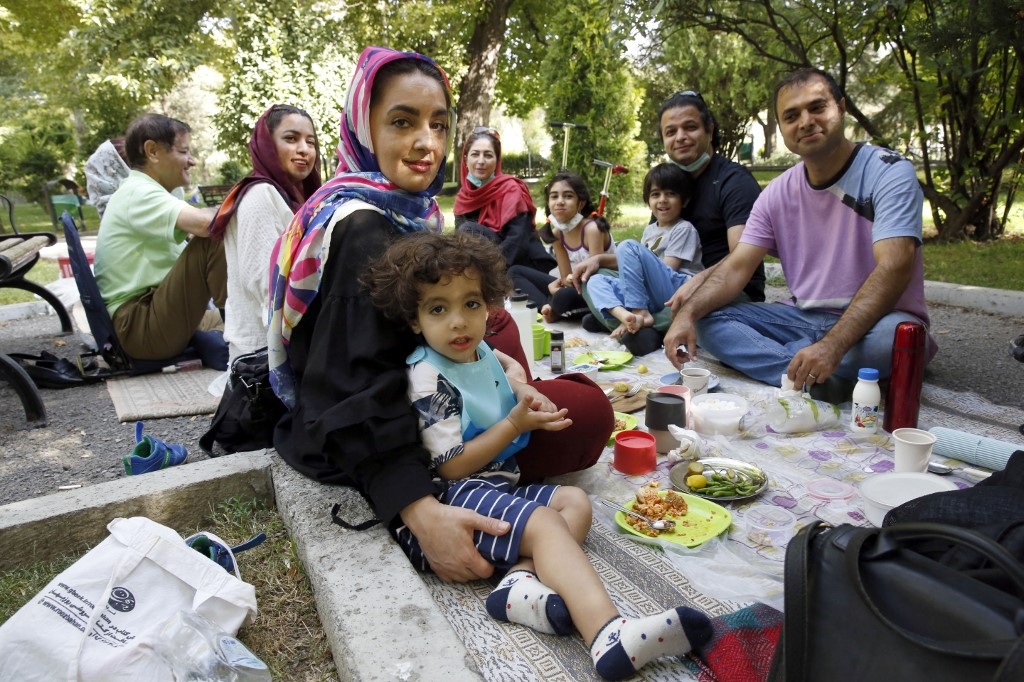
Alireza Zakani, Tehran's new ultraconservative mayor, is implementing a plan in Iran's capital city that critics say will lead to gender segregation in parks, with some seeing the move as the beginning of new restrictions in a country where all branches of power are under the control of hardliners.
The plan, to dedicate some sections of the city's parks to mothers and children, was put in place quietly but confirmed earlier this month by Mohammad Aghamiri, a hardline member of the Tehran city council.
“More than 200 parks will be exclusively for women, mothers, and children,” Aghamiri told the state-run Didban website on 9 April. More parks would follow, he said.
Aghamiri said that the plan aimed to help "a mother to easily play with her child away from the eyes” of men.
Controversial mayor
New MEE newsletter: Jerusalem Dispatch
Sign up to get the latest insights and analysis on Israel-Palestine, alongside Turkey Unpacked and other MEE newsletters
Zakani, a member of Iran's Islamic Revolutionary Guard Corps (IRGC), is a hardline figure known for his opposition to reformists and his objection to the 2015 nuclear deal with the US, which ended sanctions against Iran.
A member of parliament for four terms, Zakani has a long history of membership in the Basij militia. In the 1990s, he studied medicine at the University of Tehran before becoming a physician.
Until last year, Zakani was still in parliament. But with conservatives and hardliners winning both presidential and city council elections, he was steered by them towards the Tehran mayoral race, which he won last August.
However, many, including some conservatives, considered Zakani’s appointment as mayor illegal because his degree, which is in nuclear medicine, made him unqualified for the post. According to Iranian law, the Tehran mayor must have a degree in majors related to the position, or executive experience at the national level, which Zakani does not have.
Reformists believe that Zakani was installed as Tehran’s mayor because of influence from the hardline President Ebrahim Raisi.
Zakani had also stood in the June 2021 presidential elections, but it was widely believed that he was only there to shield Raisi in the debates from reformist attacks and criticism. In the end, before the vote, he withdrew in favour of Raisi.
Segregated parks plan
On 12 April, a few days after the announcement that some of the city's parks would become gender-segregated, a member of Tehran city council, Mojtaba Amaani, said that the plan was Zakani's. Amaani said that in those parks, a section would be for the exclusive use of mothers and women, while other parts would be available to everyone.
The project has faced a backlash from the public and reformists.
“It is a pity that the mayor of Tehran’s role model is the Taliban,” wrote the reformist Shargh newspaper on 16 April.
'Iran cannot succeed in its restrictive measures against women. It’s like trying to block the sea with your hands'
- Iranian sociologist, name withheld
“In the parks of Tehran, people in the morning take their wives and husbands while they hold their hand and go for a walk. When you make the park female-only, you take away their natural right to a simple and healthy life,” Shargh continued.
A prominent sociologist, who didn’t want her name used for fear of the authorities, told Middle East Eye that any attempt to restrict women's behaviour in today's Iran was doomed to failure.
“The Islamic Republic hasn’t achieved any of its goals against women. What they have wanted to restrict has yielded the opposite results. Iranian women have always turned restrictions into opportunities," she said.
"If Iran was like some countries in the region where society does not empathise with women's demands, then it was possible for the republic to achieve its main goals. But in today's Iran, the republic cannot succeed in its restrictive measures against women as it’s like trying to block the sea with your hands.
"Issues such as women's singing, the compulsory hijab, criminal and family law, and all demands related to women must be reviewed in Iran.”
She added: “Women will break open the doors of any kind of limitation.”
Meanwhile, a political analyst who spoke on condition of anonymity, told MEE: “Implementing this plan may result in a series of new restrictions. This project is the new idea of radicals who are coherent and powerful in the Islamic Republic establishment, and have relatively significant potential in terms of media and money.”
He added: “I’m worried what their next step would be if people do not stand up to gender segregation in parks.
“The way to provide security for women is not through building a wall in a section of a park. This behaviour and approach is being implemented in only one other place in the world: Afghanistan under Taliban rule. This is embarrassing for a country with 1,000 years of written history.”
Women and the Islamic Revolution
Following the Islamic Revolution in 1979 and the change of the constitution, various restrictions were imposed on women under Islamic law, many of which are still in place four decades later, including mandatory wearing of the hijab and a ban on female singers performing for male or mixed audiences.
This is while other laws such as unequal child custody rights, the inability to seek a divorce unless otherwise agreed upon at the time of marriage, and discriminatory inheritance laws, remain in place since the rule of Mohammad Reza Shah.
But discrimination against Iranian women also extends to other kinds of restrictions that are enforced by religious authorities for being “un-Islamic” or “against women’s values”. Running for president or riding a motorcycle are just two examples of the areas where women face discrimination despite there being no legal ban under the law.
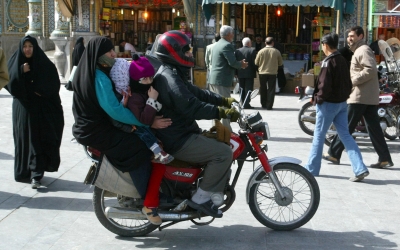
For all these restrictions, however, the Islamic Republic has encouraged education for women. For years, female students have outnumbered men at universities to the point that authorities have at times placed restrictions or quotas for admitting female students in some majors.
With a population of 84.5 million, according to figures published by the Statistics Centre of Iran, of which 49 percent are women, having a highly educated and skilled female population has resulted in a major transformation of women’s expectations in Iran, which has in many cases overturned the traditional roles of women in society.
The struggle of Iranian women fighting for their rights has been dangerous, as the state generally considers activism as a threat to national security and therefore there is no tolerance towards any major activities in this regard.
For instance, in December 2020, lawyer Hoda Amid and sociologist Najmeh Vahedi were sentenced to a total of 15 years in jail on charges of "cooperating with the hostile government of America against the Islamic Republic” on issues related to women and families.
'Stupid officials ruling the country'
On the issue of gender segregation in Tehran's parks, Peyman Afsari, a 33-year-old taxi driver, told MEE: “It is becoming official. A number of stupid officials are ruling the country.”
He then added sarcastically: “I guess in a few months we will have to show proof of marriage at the entrance to the parks?”
Meanwhile, Fereshteh Sameti, 29, a tour guide, told MEE: “Building female-only parks for women is nothing unusual, but what they are doing is erecting and building a wall right in the middle of parks, dividing the public parks for men and women. This is worrying.”
She added: “I do not know why the hardliners, instead of improving the economic situation, always seek to reduce social freedoms, especially for women.”
Masoume Riazati, 55, a retired TV worker, told MEE: “While the price of everything in the country is going high, I don’t understand the rationality of these measures. Why do the hardliners seek to make people angry?
"I don’t like former president Rouhani, but it seems like his slogan was correct when he warned that if the hardliners take over the country, they would erect a wall in the streets to separate men and women from each other.”
The issue of gender segregation in public places has always been met with widespread negative reactions.
In the first decade after the 1979 revolution, as the hijab was declared compulsory, some universities and cinemas implemented gender segregation. But that didn’t last as most Iranians would not tolerate it.
However, currently the hardliners have all the power in Iran and are seeking to rapidly enforce their ultraconservative agenda. Recently, for example, the Iranian government issued an instruction stating that women were to be banned from bodybuilding until further notice.
In March of this year, in the holy city of Mashhad, women who had purchased tickets to watch the national team play in a World Cup qualifying match were barred from the stadium and dispersed by police using pepper spray.
Also in Mashhad, police stations for women have been established, with some hardliners calling for them to be set up throughout the country.
Following the Tehran parks initiative, some cities such as Bojnurd in the east and Tabriz in the northwest also are erecting walls in some parks, dividing women from men.
This article is available in French on Middle East Eye French edition.
Middle East Eye delivers independent and unrivalled coverage and analysis of the Middle East, North Africa and beyond. To learn more about republishing this content and the associated fees, please fill out this form. More about MEE can be found here.


